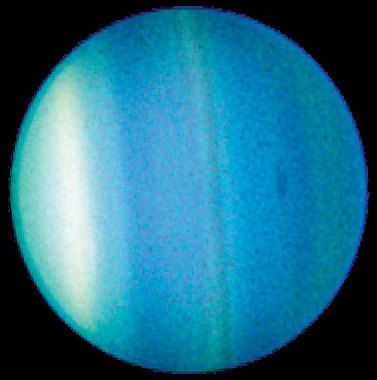SEPTEMBER 30, 2021 – Yesterday I talked about celestial majesty—the beauty of the Milky Way, the wonder of the cosmos. Today, the subject is . . . your anus. I’m joking, of course. I meant “urine—us,” which is how astronomers pronounce the problematic name of the seventh planet of our solar system, spelled U-r-a-n-u-s.
I’ve always been troubled by “Uranus.” That’s a mature way of saying I’ve not been able to mention that planet without laughing, especially when I consider that a principal element of the planet’s composition is methane, which, rightly or wrongly, I associate with overly flatulent . . . cows.
Uranus is the Latinized version of Ouranos the Greek god of the sky, and if I learned anything from my Greek classes in college, it was pronunciation. Accordingly, I know Ouranos is “ur-AHN-os,” which isn’t the least bit like your anus—I mean, “ur-ANE-us,” and thus, not the least bit funny or embarrassing to say. In practice, however, I know that anyone who heard me pronounce Ouranus would say, “Huh?” and I’d have to revert to “ur-ANE-us,” and we’d be right back where we started.
Emulating Neal de Grasse Tyson, who calls the seventh planet, “URINE-us,” doesn’t solve things either. “Urine” is not a very pleasant or satisfying word for a planet nearly identical to its neighbor with the incorruptible Latin name, “Neptune.”
The history behind the naming of “Uranus” is an interesting one. The astronomer credited with discovery of the planet—William Herschel (1781)—wanted to name it Georgium Sidus (George’s Star), in honor of King George III, who paid Herschel a 200-pound annual stipend for his discovery. The world outside England didn’t share Herschel’s enthusiasm for the looney-tunes monarch, so alternatives were floated (including “Herschel”) before the science world settled on . . . what sounds exactly like an unseemly anatomical reference or, in the name’s upgraded pronunciation, liquid bodily waste. In either case, “Uranus” is best left unmentioned when talking about . . . celestial majesty.
Among the world’s burdens, the undignified name of a distant, icy globe isn’t high on the list. On the other hand, in this age of divisiveness, maybe unity is to be found in the vast darkness of space. If we could launch a bi-partisan effort to re-name Uranus, perhaps we could escape our earthbound partisanship.
I’d avoid We R Anus, despite inclusion of the collective pronoun, and I don’t think a culture marked by #MeNow would go for self-deprecating Myanus. Given the influence of Roman mythology over planetary nomenclature, maybe we should expand our horizons. We could adopt the name of an important Eastern deity, like Tara, the female Buddha, which would also provide gender balance to our solar system. Currently, post-expulsion of Pluto, planets named after male gods—Mercury, Mars, Jupiter, You-Know-What, Neptune—are in the majority over the “female” planets—Venus, Saturn, and, of course, “Mother Earth,” or “Gaia” (Greek).
Imagine how Tara would edify the astronomer’s answer when an observatory visitor looking through a telescope trained on the seventh planet asks, “What are we looking at?”
(Remember to subscribe to this blog and receive notifications of new posts by email.)
© 2021 by Eric Nilsson
